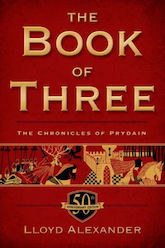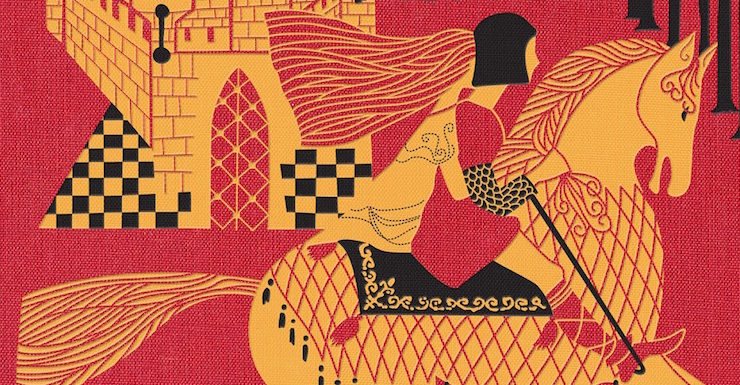Long before I fell in love with writing I fell in love with reading. Sometimes, honestly, I feel like I’m cheating on my first love when I settle into my office chair to start work on the latest manuscript. Back in my younger years I read an average of a book a day. That was when I was going to school full time and working a job after school 30 hours or more a week. Even now, years later, there are stories that I remember vividly. Some of them I remember so well and love so deeply that despite never having enough hours in the day I go back and read them again.
One series that I’ve done that with several times is Lloyd Alexander’s The Chronicles of Prydain, including The Book of Three, The Black Cauldron, The Castle of Llyr, Taran Wanderer, and The High King.
By the time I first ran across those books I’d already read a great deal of fantasy. Most of what I’d run across was (or at least seemed to me) a recycling of what Tolkien had done better with The Lord of the Rings. There were exceptions, and quite a few of them, like Michael Moorcock’s Elric and Leiber’s Fafhrd and the Gray Mouser and, of course, Robert E. Howard’s Conan, but the exceptions were mostly in the form of collected short stories. I loved them but there was something of a gap left that I was barely aware of.
And then I read The Book of Three. It started like so many of the stories I’d read, with a young boy on the cusp of manhood in a less-than-glorious position and hoping and dreaming of better things for himself. Better things that never quite seemed to come around. And then, his world is changed.
Prydain is very much its own place, but steeped in the traditional stories of Welsh mythology, stories I was familiar with, but never really all that taken by. Alexander’s writing changed all of that. His prose is direct. He seldom went into long and flowery descriptions, instead giving only small hints about what a character might look like and letting the reader connect the dots to find the hidden details. That stood out with me, because I have always preferred to draw my own conclusions on many things, and that includes what characters look like.
The story might have been the typical fare from when I started reading fantasy, it could have fallen into the very mold that drove me away from fantasy fiction for a while. The basic story I seemed to keep running across came down to this: lad dreams of adventure, laments the mundane existence, finds himself confronted by an Ancient Evil, and as the story progresses finds The Item Of Power that can save the world. Now, at that point, the lad becomes the Future Champion, if only he can somehow be kept safe by his new friends and the brave soldiers who will defend him until he can get where he’s going. Not all that much like The Lord of the Rings, but I can’t help seeing certain elements that keep creeping in. All of these things came up all too often and, if you were lucky, you could also run across the prophesy that demanded our hero alone could save the day.
There are some of those very elements in The Chronicles of Prydain, if I’m being honest. There are definitely a few similarities and I suspect Tolkien had his influence on Alexander, though I’ve no proof of it.
I said the story might have been the typical fare. Happily, it was not.
Instead—without giving away too much, I hope—Taran, the apprentice to a pig farmer who wanted so much more for himself, quickly finds himself deep above his head and drowning in chaos.
He does, in fact, run across a mythical Weapon of Power, and the very first time he tries to draw the blade he gets a serious lesson in humility. All the daydreams in the world have not prepared him to deal with a weapon that can only be drawn by somebody worthy of wielding it.
That is the moment that Taran’s real quest begins. Not the quest to defeat Arawn Death-Lord, though that is the name of the Ancient Evil in this particular case. No, his quest in a very real sense, is to survive growing up. J.K. Rowling’s Harry Potter deals with a similar crisis in the books that share his name. Stephen King and Peter Straub’s Jack Sawyer suffers the same ordeal in The Talisman. It is not a new concept. Coming of age stories are legion. The difference is in how the story is told.
Buy the Book


The Book of Three, 50th Anniversary Edition
Taran grows because he is physically maturing and because he is slowly, methodically, stripped of his innocence in many ways and forced to make choices that are, frankly, the sort that should be made by adults. Lloyd Alexander says, through the mouth of one of the wondrous characters in the books, that there are “Three principles of learning; see much, study much, and suffer much.” (That’s in quotations, but I am paraphrasing.) Taran is forced to learn in order to become an adult. In order to, in time, be ready for fighting against Arawn and his legions of Cauldron Born, undead soldiers that obey without fear of pain, or death, or loss. Through the course of the tales it isn’t just Taran that makes the sacrifices, either. He learns through example. He learns through action, he learns, amazingly enough, in much the same way that real people learn. And we get to go along for the ride and learn vicariously through his eyes.
The fight scenes are well done, dark and brooding and violent. The scenes between Taran and the girl he’s slowly falling for are wonderfully handled and the cast of characters, some who live and others who die and leave a gaping hole for the lack of them, are vivid and brilliant.
Ultimately, Lloyd Alexander’s tales of Prydain were enough to make me come back and visit again and again and each time I laughed and I wept. Each time. No exceptions.
What an amazing feat! What wondrous tales!
What a powerful talent.
Lloyd Alexander’s tales were written and published when I was in diapers. Decades later they remain utterly timeless for me. I cannot recommend them enough.
This article was originally published in July 2014 as part of our Writers on Writing series.
James A Moore is the author of over twenty novels, including the critically acclaimed Fireworks, Under the Overtree, Blood Red, Deeper, the Serenity Falls trilogy, Seven Forges, and its sequel, The Blasted Lands. He has twice been nominated for the Bram Stoker Award and spent three years as an officer in the Horror Writers Association.










